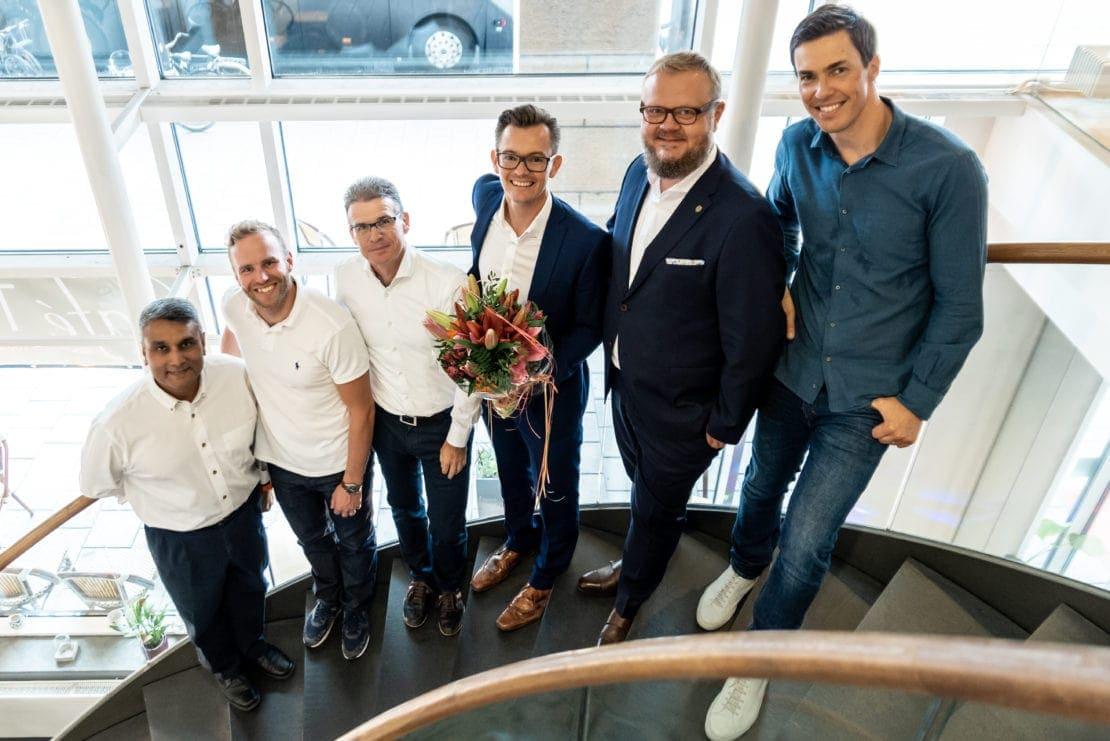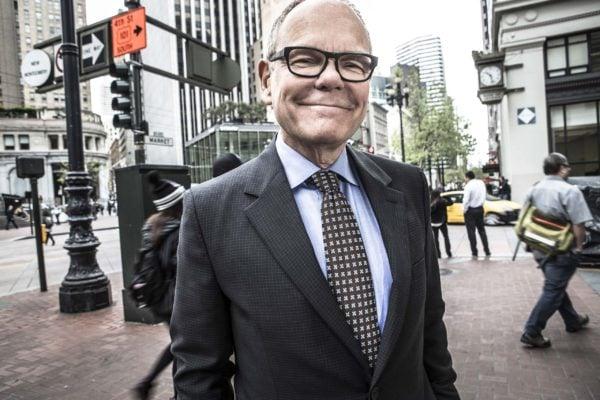22Aug2018
August 15th made company history for Nordic Business Forum! It was the final round of our Speaker Sourcing Contest, which took place in the heart of Stockholm, and we had audiences joining us in person and online via our livestream broadcast. This event was the culmination of a half-year-long contest to find fresh, new talent and ideas and give them a platform for the world to hear.
What started as an open call for applications soon crystallized into three live qualifying rounds, from which six contestants continued to the final: James Hewitt, Petri Rajaniemi, Mika Poutala, Raymond Hofmann, Gopal RajGuru, and Tobias Dahlberg. Their job was tough but simple; they each had 15 minutes to convince our jury and audience that they deserve to win the spot on stage at Nordic Business Forum 2018.
In case you didn’t manage to catch the presentations live or in person, don’t worry! We’ve got you covered with our recap of everything you missed.
James Hewitt: The Key To Sustainable High Performance
James Hewitt, head of science & innovation at Hintsa Performance, kicked things off by explaining his theory on the keys to sustainable high performance. He emphasized that, with all the technology around us, we are trying to be always on – but it’s impossible. “The real danger isn’t that machines are going to keep working like humans, but that we humans will keep trying to work like machines,” Hewitt cautioned.
Hewitt has studied 100 knowledge workers to find out more how their brains work throughout the day, and he assigned them into two categories. The first, he explained, are the 80% of people who enjoy their peak in the morning before, then experience a trough, and end the day with a rebound stage. A so-called lark, according to Hewitt. The second category comprises of the remaining 20% of people who start their day with a rebound, then experience a trough, but finish the day with their peak. These, Hewitt called owls. Though we experience these phases at different times, Hewitt explained that the tasks that we should perform at each stage remain the same. For all of us, the peak stage is the best time to focus and do analytical and productive work. During the trough, however, we should all rest, recover, and reflect. Then, we should all spend the rebound stage doing menial tasks. What’s important to remember is that one person’s peak might be another person’s rebound – something to consider when scheduling early morning meetings!
What Hewitt has learned from his research is that, by focusing on the right task at the right time during your day, cognitive performance can improve by 10-15%. Thus, he believes he has found the keys to sustainable high performance: 1) be clear about where to focus your effort; 2) be disciplined about when to rest; 3) find and follow your own rhythm. If you want to improve your performance, master all 3 keys!
Petri Rajaniemi: Rage Against The Machine – The Nordic Edition
Petri Rajaniemi, CEO of Ponder Nobs, started his speech on artificial intelligence with a short history lesson. He pointed out that, even though all the three industrial revolutions we’ve already gone through eventually created more jobs than they destroyed, it took us five generations to realize the positive change. In the meantime, we also lost millions of human lives due to this fear of change. Unfortunately, we haven’t learned our lesson. Rajaniemi notes that there is still a stigma associated with AI and its potential. And, if this fear goes unnoticed or ignored, it may evolve to rage.
According to Rajaniemi, the world could learn how to fight this fear by taking a page out of the Nordic countries’ playbook. The Nordics have been able to rise to the top of many different rankings in terms of happiness, safety, quality of life, and even wealth. Rajaniemi argues that success can be attributed to the Nordic’s sense of trust in the system and in its people. “It’s a system of people living together. A combination of businesses, politics, institutions, a market economy, and most importantly – as researched – the trust between people.”
Therefore, Rajaniemi suggests that whenever we have a new idea, we should think whether it will create trust or fear. If it generates fear, you shouldn’t be as quick to adopt it as trust-inducing ideas. The fear must be acknowledged, corrected, and then acted upon. To end, Rajaniemi calls out business leaders by saying: “The future is business driven. If we want all that AI has to offer to humanity, we cannot afford for you not to notice or to ignore the fear of others. Even if you don’t feel the fear yourself, you have to understand it if you want to lead.”
Mika Poutala: How Three Hundredths Of a Second Changed Me
Mika Poutala, the 4-time Olympic speed skater, had a different way of addressing peak performance. He shared his journey of becoming an Olympic speed skater and reflected on the lessons that he learned along the way. Poutala began by explaining how he got depressed as a child when his father passed away. His mother tried to help him find a hobby to distract him from his grief, and so she took him speed skating – an activity that he quickly started to enjoy. As his passion in the skating rink grew, he found himself working towards a goal: to get to the Olympics one day.
In 2006, his dream came true when he made it to the Torino Winter Olympics. Even though his performance met his expectations, he realized that he wanted more. He wanted an Olympic medal. To do this, he needed to step up his game. Beyond taking better care of his nutrition and sleeping more regularly, he started to focus on building a stronger mindset. This got him to the 2010 Vancouver Olympics where he won his first race. But he lost the medal in his second race by 0.03 seconds. Poutala was crushed; he felt like he had lost his identity along with the medal.
It took some time for Poutala to get back on his feet but he eventually pushed himself through to the 2014 Sochi Olympics. He had gone back to his training, working on his identity, values, nutrition, sleep, exercise, and mindset, and he felt stronger than ever. However, Poutala lost again by the same magic number: 0.03 seconds. He was devastated. Poutala called his wife, preparing himself to speak to his children about his loss, but instead discovered that they were watching cartoons instead of the race. Poutala’s anger quickly turned to serenity when he realized that the loss of the race didn’t affect how his children felt about him. He wasn’t a failure in their eyes so long as he continued to be a loving and caring father at home – a perspective that changed his own opinion on the loss. Poutala’s bottom line: peak performance actually derives from admitting your own failures and moving forward. As such, the key to peak performance is a strong foundation.
Raymond Hofmann: Management (Not Leadership) As Competitive Advantage
Raymond Hofmann, the owner at raymond hofmann management, brought us back to a classroom as he taught us how a clear management strategy can actually be a competitive advantage for a company. He started with a simple point: management today isn’t doing its job. For example, 75% of new products and services that companies bring to market fail to be commercially successful, and 70% of organizational change programs fail to reach their objectives. “We are failing and wasting human potential.” Hofmann argued that the reason for these statistics is that managers don’t read the theory and, consequently, they don’t know how to do (or be effective at) their job.
But all hope is not lost. Hofmann explains that we need to make it easier for companies and managers to focus on the real work of management and ground that work in theory. To do this, he has developed a management model design that starts with 5 questions for organizations to answer: (1) How does the organization execute its current business model; (2) How does the organization innovates new business models; (3) How does the organization build bridges to connect both; (4) How does the organization learn, improve, and change; and (5) How does the organization enable people to perform at their highest levels? Once these questions are answered, organizations have to define the systems, tools, and practices required to implement the answers to these questions. Then, organizations need to choose the management theory that supports their thinking.
Hofmann points out that every organization has a management model but it’s often not visible and clear to its employees. Almost every organization can explain their business model but very few can explain their management model. But Hofmann reminds us that every company needs both: a strong business model and a strong management model. “In today’s world where everyone has access to the same technology, people, and ideas, I believe that business models can actually be copied quite easily – and we see that all around. That’s why I argue that your only hope for true and lasting strategic advantage is a well-designed management model.” You heard the man, it’s time for an overhaul!
Gopal RajGuru: The Tea bag Effect – 5 Secrets to Peak Performance
Gopal RajGuru, the managing director at Innovate+Grow Consulting, focused on explaining his five secrets to peak performance. Comparing leadership to tea, RajGuru argued that you have to have the right mix in the bag to make the outcome perform at its best (and taste delicious). That mix, according to RajGuru, is made up of trust and belief and leads to peak performance when fostered by employers with the right mindset. “If you can create joy and if your people love what they do, they perform better.” People want and need love, attention, and feedback – even at work. This is why managers and leaders need to put more time into noticing their people and praising them.
To do this, RajGuru offers a great tool for giving praise and feedback. First, you need to address how you feel about the action of your employee. Second, you should specify what was the excellent performance you are referring to in order to provide something concrete and personal. Third, you have to say why it was important. This can come together in a statement such as: “I was really impressed with the project update that you presented to the board yesterday because it was clear, concise and helped them make the decision you needed about funding.” This way of giving feedback is not only more precise and clear but also richer than a simple thank you. In addition to this feedback formula (I feel + when you + because), you should make a specific suggestion for improvement and explain a tangible reason for the change. Following the example, one might add: “… and if you could add two graphs that highlight the growth over last year’s numbers, then it would help them understand more easily why you need the funding for additional technical staff.”
Finally, RajGuru threw down a gauntlet of challenge: “Do this once a day. If you can’t do it, then you’re not paying attention.” He concluded by emphasizing that, if done right, feedback can be a gift to your employee with which they will be able to perform better.
Tobias Dahlberg: The Only – The Most Powerful Strategy In Business
Tobias Dahlberg, a strategist, entrepreneur, and CEO at Wonder Inc., revealed what he claimed to be the most powerful strategy in business. “We live in a world, where customers have more information and more choices available than ever before, which means that there’s no place for mediocrity in business. This is the end of competitive advantage as we know it.” In essence, customer choice is the ultimate test of a strategy.
Dahlberg advised all businesses to stop obsessing about products but instead start obsessing over customers. The winning strategy, he claimed, is to focus on improving and developing your customers: “The company that is able to create the most value wins.” Dahlberg also reminds us that value is subjective and it is more important than ever for companies to focus, specialize, and differentiate instead of trying to attract the masses.
Dahlberg recommended that companies work towards being considered the only choice by customers in their respective industries – that’s where you’ll find a position of power. “You have to do something for the customers that nobody else does”, he continued. But how do you become the only choice? “You have to start creating value beyond the product,” Dahlberg explained. In addition, he advised his audience to think not only of a company’s why (from Simon Sinek’s Start with Why concept) but to strongly consider the customers’ why. To finish, Dalberg challenged business to start creating a vision for their customers, and we encourage you to do the same. How do you want to change and differentiate your customers? How do you want to grow your customers? What’s your vision?
So, who won? Drumroll, please…
Our grand finale definitely lived up to its name – it was an exciting and tense event, and you could feel the heat in the room, even if you were just watching online. It was a narrow race to the finish line. In fact, two contestants were tied by the jury votes, so we had to crunch the numbers to get to a winner.
The winner of our first ever speaker sourcing contest was James Hewitt!! Hewitt was the one of 171 applicants who entered to win this contest earlier this year. He will give his winning presentation at Nordic Business Forum 2018 in Helsinki in September and be paid a 30,000 € speaking fee. If you’d like to see his presentation, make sure you get a ticket before they sell out.
What a journey it has been!! We’d like to thank all the participants at every stage of the competition – you did a fantastic and commendable job, and we hope that this experience has helped you build on your already great talents as speakers and teachers. Also, thank you, everyone, who initially applied, followed the process, joined us in person, and/or tuned in online and on social media. It’s been a pleasure having you with us.
We hope you enjoyed the ride! We look forward to seeing you again.

 by:
by: 
